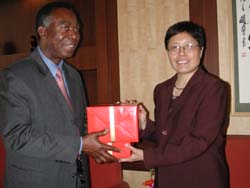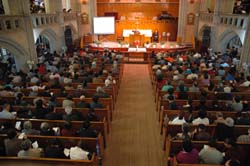A 10-day visit by leaders of the Seventh-day Adventist world church to the People's Republic of China, April 22 to May 2, connected the delegation with local Adventists, as well as with government officials overseeing religious work in the world's most populous nation.
Pastor Matthew Bediako, general secretary of the world church, headed the Adventist delegation. Dr. Lyn Behrens, president of Loma Linda University Medical Centre, was part of the group, as was Dr. Jairong Lee, president of the Northern-Asia Pacific region of the Adventist Church, with headquarters in Seoul, Republic of Korea. Also in the delegation were Pastor James Wu, president of the church's Chinese Union Mission; William G. Johnsson, editor of the Adventist Review, and Glenn Mitchell, communication director of the Northern-Asia Pacific region.

Delegates met with officials of the state Bureau of Religious Affairs, which oversees religious activities, as well as with the Three-Self Patriotic Movement (TSPM) of the Protestant Churches in the People's Republic of China, organized in 1951, which proclaims a common program for all Christians in China, of self-government, self-support, and self-propagation. The delegation also met representatives of the China Christian Council (CCC), founded in 1980. The CCC sees itself as an umbrella and a service organization for all Protestant Christians in China, including the True Jesus Church, the Little Flock, and the Seventh-day Adventists which have kept their denominational characteristics in the so-called post-denominational period in the history of the Church in China. Mrs. Guo Wei, deputy director general of the State [national] Religious Affairs Department, hosted the highest-level meeting.
During their visit the Adventist delegation listened to numerous presentations on the topics of theological reconstruction, the situation of the Chinese Christian church, and religious policy in China.
Following his return from Beijing, Pastor Bediako commented that, "It was a privilege to visit this great country and worship with our believers. I was touched by their devotion, dedication and strong faith.
"Meeting with government officials was also a worthy occasion. I appreciated their friendly and warm reception of our delegation and their willingness to protect the rights of minority believers," he added.
The Adventist church delegation initially was to be led by Dr. Jan Paulsen, president of the World Church. Last-minute developments prevented his presence on the visit. "For some time I have been planning to make this visit, both to meet with the members of the Adventist family, and to meet leaders within the government and religious community," Paulsen said. "For unforeseen reasons, this had to be cancelled at short notice. But while I am disappointed not to have been able to go through with these plans at this time, I look forward to opportunities to visit a flourishing Adventist faith community, and for building even better relations with the authorities in China. I know that the Lord will lead in this endeavour."

In 2002, there were over 317,000 adult Adventist Christians in the People’s Republic of China, worshipping in more than 850 congregations.

According to the incomplete Chinese statistics the vast majority of China's Protestant Christians live in the countryside, but city churches also continue to grow, reports the Adventist Press Service (APD). Chinese Protestant churches used to be dominated by elderly women. While the average age of congregations is slowly coming down due to the influx of new, younger believers, women still make out the majority of Christians. Today about 70 percent believers are women.
As a result of the growing number of women believers, the ratio of female applicants for Seminaries and Bible schools has increased, and more than half of the students enrolled are female. Of China's 23 Seminaries and Bible Schools, two are headed by women, and one third of the teachers are female.
Quoting recent China Christian Council figures APD writes that about 24 percent of all ordained Protestant pastors are women pastors. Moreover, there are 415 ordained women elders, who were mostly ordained during the past twenty years. Between 70 to 75 percent of Christian lay workers are women, and many grassroots activities such as women's Bible groups, Prayer meetings or Women's choirs are in fact organized and attended by women. [Editors: ANN Staff and Christian B. Schaeffler, APD]
